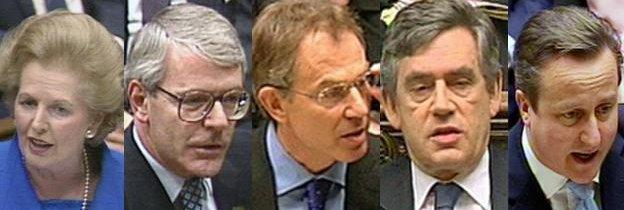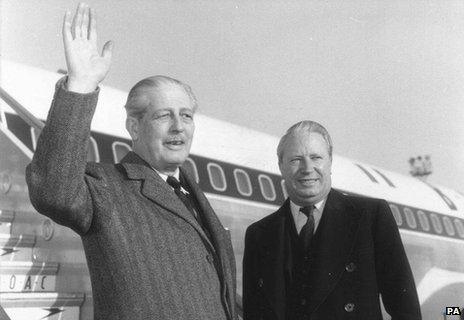Is Prime Minister's Questions really getting worse?
- Published

House of Commons Speaker John Bercow says he's had enough of bad behaviour during Prime Minister's Questions and is asking party leaders to put a stop to it. But is there any need?
Miss Gillian Lloyd was not a happy woman and was determined to let the nation know.
In April 1978, the schoolteacher from Birmingham wrote to The Times to share her anger at the behaviour of MPs, as heard on her radio.
Her letter read: "Sir, I teach a class of 11-year-olds. We try to learn (among other things) mutual tolerance, patience and good manners. Returning from school today I listened to the [parliamentary] speeches and found, as jeer and interruption followed one on another, my temper rising at such a poor example of manners and self-control.
"If the culprits were in my class they would have a detention."
'Depressing'
Move forward almost 36 years - to just a couple of weeks ago - and an equally vexed John Bercow proposed a similarly scholastic punishment for Education Secretary Michael Gove, whom he accused of shouting across the Commons chamber.
"Order," the Speaker shouted above the swell of noise. "Mr Gove, you really are a very over-excitable individual. You need to write out a thousand times: 'I will behave myself at Prime Minister's Questions.'"
Exasperated by what he sees as a decline in standards, Mr Bercow has written some lines himself to the leader of the three main parties - David Cameron, Ed Miliband and Nick Clegg - asking them to work out a way to bring order and decorum to the weekly Q&A session.

Michael Gove was not amused to be given lines by the Speaker
Mr Cameron once said he wanted to bring an end to the "Punch and Judy" show of PMQs, but later admitted it was a vain hope.
Mr Miliband has also spoken of his desire to calm things down and present a more grown-up, mature debate to the world.
But is this necessary? Surely a lot of people like the rough and tumble of parliamentary debate in its rawest, most partisan form, don't they? And hasn't it always been like this, anyway, or at least when politics was supposedly more polarised during the 1980s?
Former Liberal Democrat leader Sir Menzies Campbell, an MP since 1987, doesn't think so.
"Prime Minister's Questions today is very different from what it was in the days of Macmillan, Wilson and Callaghan," he says. "Then you could ask a serious question and get a serious answer, but now it has become an opportunity to trade insults.
"Another thing is MPs asking the question which invites the prime minister to praise something happening in their constituency so they can tell their local newspaper that it's been mentioned in Parliament."
Sir Menzies thinks it will be "very difficult" to change MPs' behaviour before the next general election, set for 2015 and, even after that, will require "discipline" from party leaders.
Labour MP Paul Flynn, also in Parliament since 1987, agrees with Sir Menzies.
There has been a "steady deterioration" in behaviour, he says, calling Prime Minister's Questions a "depressing experience".
"It's going downhill and it's getting worse," he says. "I think the insults are offensive - calling people stupid or lazy or worse. That didn't happen in the past. It's counter-productive.
"Women find it more offensive than men. Being a sensitive soul myself, I tend to wince at how cruel they are."
Prime Minister's Questions - known to all at Westminster as PMQs - began in 1961, when Conservative Harold Macmillan was in 10 Downing Street.
Its supporters argue that it allows MPs to question directly the head of government, giving a degree of accountability unknown in most of the world.
Its detractors contend that it has turned into a choreographed insult-fest, in which hollered abuse, pre-scripted soundbites and easy, planted questions - handed to MPs by party managers - have become a substitute for meaningful debate.
PMQs is, by far, the most-watched event in the parliamentary week, and even has a cult following in the US, where it is broadcast on C-Span.
Some have called for it to be moved from midday at Wednesday to a prime-time TV slot to increase its potential audience.
Speaker tells Education Secretary Michael Gove told to write lines
Mr Flynn feels this would further degrade the event, turning it into mere "entertainment", and argues that viewers are already getting a worse experience than MPs.
The microphones pick up too much background "Dalek-like" sounds, drowning out principal speakers, he says, suggesting their settings should be changed, to detect less of the hubbub and more of the debate.
Contrary to Mr Flynn's point, one of the main arguments against allowing radio microphones, which were switched on in the Commons 1975, and TV cameras, which arrived in 1989, was that they would make MPs more sedate.
'Activist-Speaker'
Mr Bercow, for one, thinks this has not happened. He has intervened more and more, often singling out MPs, such as Mr Gove, for criticism.
Conservative MP Alec Shelbrooke thinks this compares badly with the work of his predecessor-but-one as Speaker, Betty Boothroyd.
On Twitter, he writes: "Bercow needs to look in the mirror. Betty never had the need to resort to whining."
But another Conservative MP, Douglas Carswell, feels a little bit of "humiliation" of his colleagues and rivals is not a bad thing.
He describes Mr Bercow as an "activist-Speaker", who fights for the rights of individual backbenchers to be heard.

Harold Macmillan and Edward Heath both felt the fire and fury of PMQs
To Mr Carswell, PMQs has long been little more than "a game", he says, adding: "An MP's job is to represent their constituents and hold the government to account. People in Parliament have completely lost sight of that.
"Some see it as their job to be cheerleaders for the front bench and to ask a planted question."
So the waves of derision and adulation which flow back and forth across the chamber are wrongly seen as individual misbehaviour.
Mr Bercow, whom some Conservatives have accused of bias against their side, berates MPs because he sees them being orchestrated by party whips, Mr Carswell says.
This, he says, is aimed at strengthening free speech and spontaneity, not undermining it.
John Bercow tells Labour MP Tom Blenkinsop: "Calm yourself; take up yoga"
"To be fair, a little bit of heckling is a good thing," Mr Carswell says. "When I stand up to ask a question at PMQs, it would be weird if I didn't get a bit of a response. If people just listen in silence, it can't be very interesting."
However, he says: "If you jeer every single time anyone on the opposite benches asks a question or cheer every time one of your colleagues does so, you're not doing your job.
"But things are improving under John Bercow. In 2005, when I first came to Parliament, I would say, almost all questions on both sides were plants. It's clear that in the age of Twitter you get branded more quickly and run a greater risk of looking foolish if you do so. The reservoir of MPs willing to trade their integrity for preferment is drying up a little.
"I would be concerned if I didn't get a bit of genuine hectoring and disagreement. We need a clash of subjective views. There should be nothing neat about it."
Few would argue that there should be, but whether Messrs Cameron, Miliband and Clegg can bring down the volume level - and turn MPs into an example for the nation's children -remains to be seen.
- Published18 February 2014
- Published11 February 2014
- Published30 January 2014
- Published5 February 2013
- Published4 February 2013